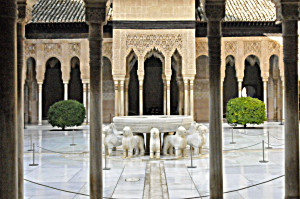During 1492, the Alhambra in Grenada, Spain, was at the center of events that literally changed the direction of human history. Today the Alhambra is the finest example of Islamic architecture in Europe.
Grenada was founded in the eleventh century by successors of Muslims who had captured most of what is now Spain from the Visigoths in 711. By 1248, Christian forces had recaptured all major Spanish cities except Granada. Grenada, whose Muslim rulers welcomed its Jewish residents, became one of the most important cities in Europe. In the fourteenth century, Grenada’s Nasrid rulers completed the Alhambra on a hill overlooking the city as a combined fortress and palace. The main courtyard surrounded a circle of twelve marble lions, representing the twelve tribes of Israel, carved by Jewish craftsmen. The palace included an imposing Hall of Ambassadors, where the Sultan of Granada received visitors.
On January 2, 1492, the Sultan surrendered the Alhambra to the superior forces of Ferdinand II and Isabella I, the “Catholic Kings” whose marriage had united two Spanish kingdoms. Isabella immediately occupied the chair in the Hall of Ambassadors, reportedly receiving Christopher Columbus. Columbus, who had seen Granada fall, pitched anew his plan to sail west and convert the Muslims of India to Christianity.
The “Alhambra Decree,” issued by Ferdinand and Isabella on March 31, 1492, ordered all Jews to leave Spain within four months unless they converted to Christianity. On April 17, Ferdinand and Isabella commissioned Columbus to sail to India and he left Granada on May 12. By July 31, up to 800,000 Jewish residents had fled Spain to avoid execution without trial. On October 12, 1492, Columbus, who may have been secretly Jewish, encountered the lands of the “New World” he insisted to his death were part of India.
In April 1992, five hundred years after the Alhambra Decree, Spanish King Juan Carlos, wearing a yarmulke, welcomed descendants of the expelled “Sephardic” (Spanish) Jews back to Spain, where they can now become citizens. The Alhambra, witness to the best and the worst of Spanish history, has become one of Spain’s most popular sites.
